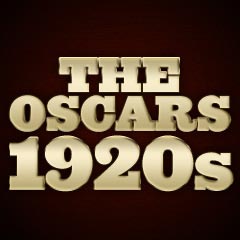 1929-30 Academy Awards® Winners and History |
Introduction, 1927/8-39, 1940s, 1950s, 1960s, 1970s, 1980s, 1990s, 2000s, 2010s, 2020s Academy Awards Summaries |
"Best Picture" Oscar®, "Best Director" Oscar®, "Best Actor" Oscar®, "Best Supporting Actor" Oscar®, "Best Actress" Oscar®, "Best Supporting Actress" Oscar®, "Best Screenplay/Writer" Oscar® |
![]()
1929-30
Actor: One of the greatest of all anti-war films, Universal Studios' and director Lewis Milestone's controversial All Quiet On The Western Front (with four nominations) won two major awards - Best Picture (for producer Carl Laemmle, Jr.) and Best Director (Milestone had won his first director's award for Best Comedy Direction -- the only winner in a short-lived category -- for Two Arabian Nights (1927/28) in the first Academy ceremony). These wins marked the first time that the film's director was also honored as Best Director along with the Best Picture win. The anti-war film was based upon Erich Maria Remarque's grim anti-war novel (by playwright Maxwell Anderson and others) about a group of German school boys (with a focus on one in particular, Lew Ayres) who excitedly served the Fatherland, became disillusioned, and learned about fear and death during the Great War's weary combat. Due to its bleak picture of war, the film was banned in Germany after Hitler's rise to power. The other Best Picture nominees were:
Some of the greatest early film directors lost to Lewis Milestone this year: Clarence Brown for Anna Christie, King Vidor for his first talkie - MGM's Hallelujah! (and the first all-black feature film), and Ernst Lubitsch for The Love Parade. George Arliss' win for Best Actor made him the first British star to win an award. He won the award for his role as wily Benjamin Disraeli, the famous, wily 19th century British prime minister of No. 10 Downing Street to Queen Victoria in one of the earliest of Warners' biographical pictures, Disraeli, an American film. [This was Arliss' third performance as England's Prime Minister - he had played the role on stage in 1911 and in an earlier silent film version in 1921. His win made him the first to win the award for a role he'd played in film and on the stage.] He defeated himself - he was also nominated for his role as the Rajah of Rukh in The Green Goddess. The other Best Actor nominees were:
There were two double-nominees in the Best Actress category: Norma Shearer and Greta Garbo. Norma Shearer (with her first nomination), the wife of MGM's Vice President and production head Irving Thalberg, won the Best Actress award for her role as free-spirited Jerry - the vengeful wife of her philandering journalist husband whose marriage is shattered by adultery in director Robert Z. Leonard's pre-Code melodramatic tearjerker The Divorcee (with four nominations and one win) based on Ursula Parrott's novel "Ex-Wife." [The Hays Office ordered that the original title of the film be changed from Ex-Wife.] Shearer was also simultaneously nominated for her role as Lally in Their Own Desire (the film's sole nomination), another MGM film. To everyone's surprise, Shearer (favored by being married to MGM studio's Irving Thalberg) won over Greta Garbo's two nominations:
[In fact, Greta Garbo, with a total of four nominations in her short career never won an award for any of her films - she was also nominated for the superb Camille (1936) and Ninotchka (1939). Garbo's favorite director Clarence Brown, the director for Anna Christie and six other Garbo films, never won an award for himself either.] Trivia: This was the first instance in which blood relatives won awards in the same year: Best Actress Norma Shearer, and her brother, sound engineer Douglas Shearer. This also occurred in 1948 (for Walter and John Huston) and in 1974 (for Francis Ford Coppola and his father Carmine). See more below. The other Best Actress nominees included:
Frances Marion won the Best Writing Achievement Award for the prison drama The Big House - it was a pioneering effort because she was the first woman to win an award for a non-acting achievement (the award was not given after this year). The Big House also won the award for Best Sound. One of the films that lost in the competition for Best Cinematography was Howard Hughes' Hell's Angels - it featured the debut of platinum blonde Jean Harlow. A unique first: Best Actress winner Norma Shearer and Best Sound Recording winner Douglas Shearer for The Big House were blood relatives (sister/brother).
Oscar Snubs and Omissions: Curiously, none of the actors in the Best Picture-winning All Quiet On The Western Front - Louis Wolheim or Lew Ayres - received a nomination for Best Actor. G. W. Pabst's silent German film Pandora's Box and its American star Louise Brooks, with an erotic performance as a seductress, were un-nominated. Rouben Mamoulian's first film Applause, a melodramatic backstage look at show business often noted for its innovations in sound technology and camera movements/angles, was ignored. |
||||||||||